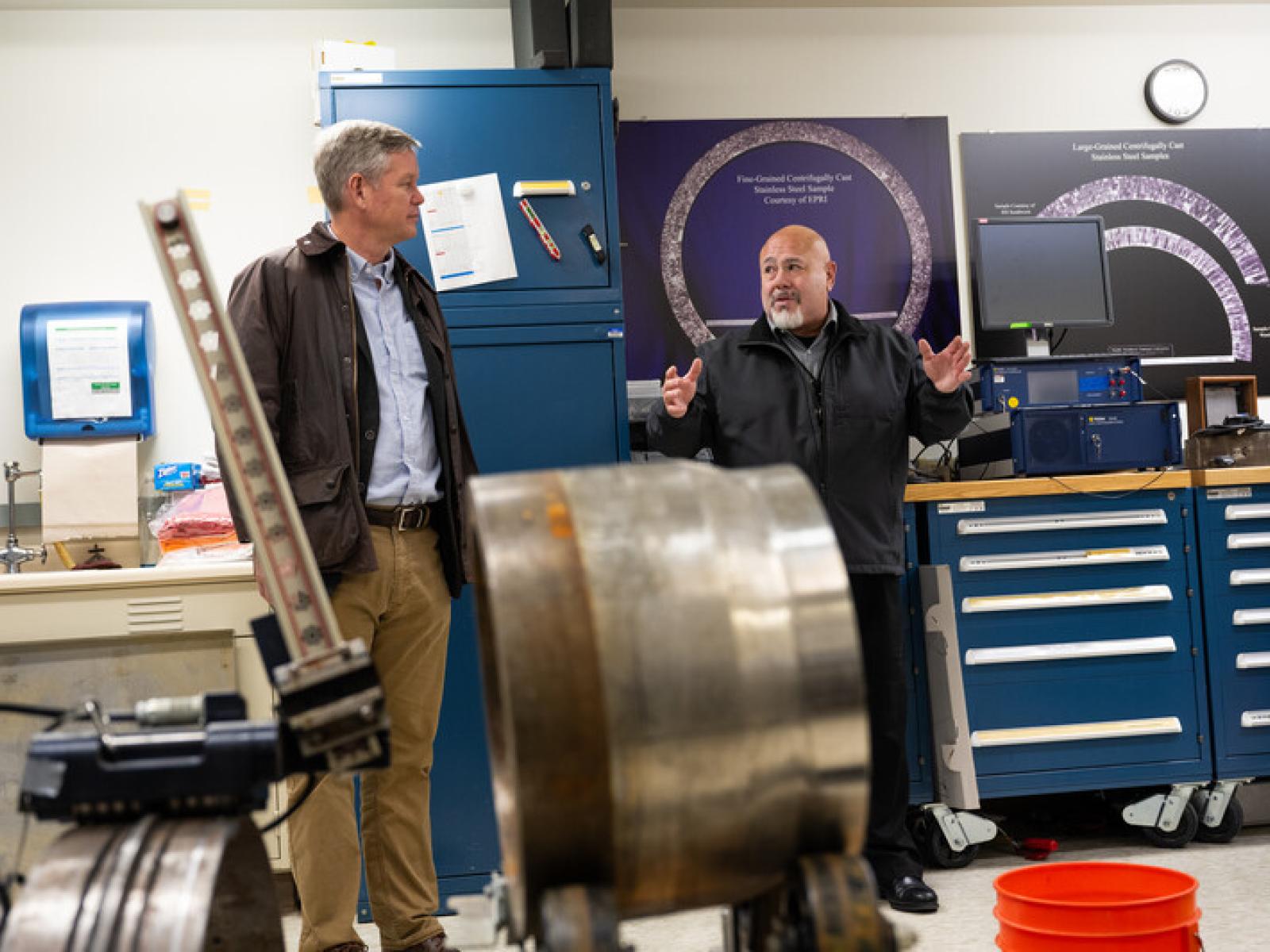U.S. Nuclear Regulatory Commission Chair Visits PNNL
NRC Chair Christopher Hanson tours the nondestructive examination laboratories and learns more about PNNL’s broad support to the NRC mission

Physicist Aaron Diaz gives Nuclear Regulatory Commission Chair Christopher Hanson a tour of the nondestructive examination and aging cables labs at 2400 Stevens.
(Photo by Andrea Starr | Pacific Northwest National Laboratory)
A longtime partnership supporting the U.S. Nuclear Regulatory Commission (NRC) with regulating the nation’s fleet of nuclear reactors and safely deploying the next generation of advanced reactors was recognized during a visit by NRC Chair Christopher Hanson to Pacific Northwest National Laboratory (PNNL).
“For nearly 50 years, PNNL has proudly supported the NRC, providing key capabilities in materials science, environmental reviews, and the nuclear fuel cycle to help sustain our nation’s nuclear power plant fleet,” PNNL Director Steve Ashby said. "We appreciate the time Chair Hanson and his team spent at PNNL to interact with our talented staff and see firsthand how their contributions and expertise support the NRC’s important mission.”
PNNL’s history of supporting the NRC dates back to 1974, when the Energy Reorganization Act gave the regulatory role that was formerly part of the Atomic Energy Commission to the NRC. From the mid-1960s through the 1970s, construction was underway for a majority of the current U.S. commercial nuclear power plants. In October 1968, a draft global standard for Inservice Inspection of Nuclear Reactor Coolant Systems was issued by ASME for trial use and comment.
Active construction and the draft ASME Code, combined with knowledge gaps arising from early nuclear power plant operational experience, led the regulators at NRC to seek out expertise including materials characterization and nondestructive examination (NDE), marking one of the first projects with PNNL.
NDE is the use of noninvasive methods to determine the integrity of materials, structures, or components. A program was launched at PNNL to provide the necessary science and engineering to support the agency’s Defense-in-Depth philosophy for the safe operation of U.S. commercial nuclear power plants. The Defense-in-Depth philosophy maintains that all nuclear power plants should be designed, built, and operated to prevent and mitigate accidents with the use of multiple independent layers of defense for safety and emergency response measures.
During the visit to PNNL in Richland, Washington, NRC Chair Hanson, Deputy Chief of Staff Cinthya Roman, Technical Assistant for Reactors Tony Nakanishi, and Technical Assistant for Materials Lisa Dimmick toured the NDE laboratory, where state-of-the art sensors and techniques are used for flaw detection, sizing, and materials characterization research. The NDE research partnership between PNNL and the NRC has resulted in a depth of knowledge captured in more than 250 Nuclear Regulatory Reports and Technical Letter Reports to date, representing the ongoing evolution of NDE to address emerging issues in the commercial nuclear power industry.
Today, PNNL continues to provide support across all key areas of NRC, including NDE, aging management of materials, probabilistic risk analysis, fuel performance, the nuclear fuel cycle, and environmental reviews. As part of the visit, the NRC team heard flash talks from PNNL staff discussing support in those areas, as well as the areas of environmental justice, tribal engagement, and decommissioning of nuclear power plants. Staff also discussed support in spent nuclear fuel transportation, advanced reactors, digital instrumentation and controls, human factors in operating nuclear power plants, and the Radiation Protection Computer Code Analysis and Maintenance Program (RAMP).
Just recently, PNNL staff supported the NRC’s annual Fall RAMP Users’ Group Meeting. The purpose of RAMP is to develop, maintain, improve, distribute, and provide training on NRC-sponsored radiation protection and dose assessment computer codes to domestic and international code users.
PNNL’s diligence in avoiding organizational conflicts of interest (OCOI) has allowed for the extensive support of NRC efforts over the years. This has been done while serving both the Department of Energy and industrial sponsors in research for the advancement of nuclear energy and in the regulatory function essential to the safe operation of current nuclear power plants.
Published: October 31, 2023